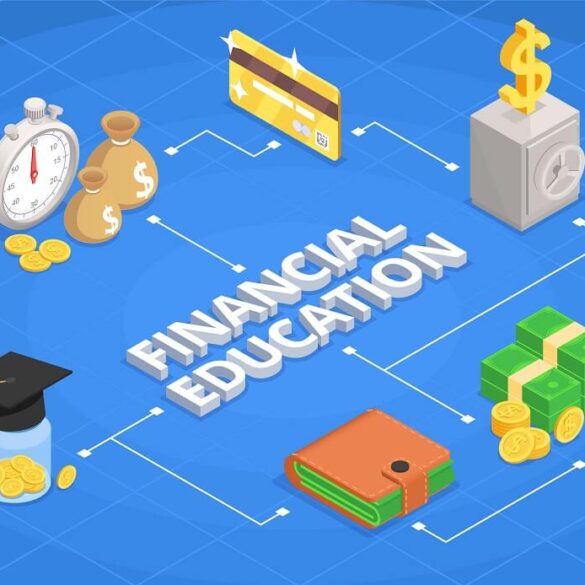Table of Contents
Teaching financial literacy through formal education programs
Teaching financial literacy through formal education programs plays a crucial role in equipping individuals with the knowledge and skills necessary to make informed financial decisions. In today's complex economic landscape, the importance of financial literacy cannot be overstated.
This article delves into the significance of integrating financial education into formal curricula, exploring the various strategies, challenges, and best practices involved in educating students about personal finance. By examining the role of schools in promoting financial literacy and assessing the impact of such programs, we can better understand the value of empowering individuals with the tools to navigate the financial challenges they may face.
Introduction to Financial Literacy Education
Financial literacy education is like giving your money smarts an upgrade. In a world where financial decisions can make or break your future, knowing how to budget, save, and invest is crucial. Let's dive into how formal education programs are stepping up to teach us the money game.
Importance of Financial Literacy in Today's Society
Financial literacy isn't just about knowing the difference between a stock and a bond; it's about empowering individuals to make informed financial decisions that set them up for success. In a world where money talks, being financially savvy is the key to unlocking opportunities and achieving financial well-being.
Overview of Formal Education Programs in Financial Literacy
Formal education programs in financial literacy are like the superhero capes of the education world, swooping in to rescue us from the perils of financial ignorance. These programs aim to equip students with the knowledge and skills needed to navigate the complex world of personal finance with confidence and competence.
Role of Formal Education Programs in Teaching Financial Literacy
Formal education programs are the unsung heroes in the battle against financial illiteracy. By bringing financial literacy into the classroom, these programs are not just teaching students about money – they're empowering future generations to take control of their financial futures.
Benefits of Incorporating Financial Literacy in School Curriculum
Including financial literacy in the school, curriculum is like giving students a backstage pass to the world of money management. From understanding credit to mastering budgeting, these programs set students up for success in adulthood by arming them with essential financial skills.
Comparison of Various Educational Approaches to Financial Literacy
When it comes to teaching financial literacy, not all educational approaches are created equal. From interactive games to real-world simulations, educators have a plethora of tools at their disposal to make learning about money engaging and effective.
Curriculum Design and Implementation Strategies
Creating a solid financial literacy curriculum is like crafting the recipe for financial success. By incorporating key components and following best practices, educators can ensure that students are equipped with the necessary skills to thrive in an increasingly complex financial landscape.
Key Components of a Comprehensive Financial Literacy Curriculum
A comprehensive financial literacy curriculum is like a well-balanced meal for your money mind. Covering topics like budgeting, saving, investing, and debt management, these key components ensure that students are well-prepared to tackle real-world financial challenges.
Best Practices for Implementing Financial Literacy Programs in Schools
Implementing financial literacy programs in schools is more than just checking a box – it's about creating an environment where students can learn, practice, and apply financial skills in meaningful ways. By following best practices, educators can ensure that these programs have a lasting impact on students' financial futures.
Integrating Real-world Financial Skills in the Classroom
Bringing real-world financial skills into the classroom is like adding a dash of practicality to the financial education mix. By incorporating hands-on activities, simulations, and case studies, educators can bridge the gap between theory and practice, preparing students for the financial challenges that await them in the real world.
Hands-on Activities for Teaching Financial Literacy
Hands-on activities are like the secret sauce of financial literacy education, turning abstract concepts into tangible learning experiences. From budgeting games to investment simulations, these activities engage students and reinforce key financial skills in a fun and interactive way.
Simulation Exercises and Case Studies for Practical Learning
Simulation exercises and case studies are like the virtual reality of financial education, allowing students to test their knowledge and skills in a risk-free environment. By immersing students in real-world financial scenarios, educators can help them develop critical thinking and decision-making skills that will serve them well in their financial journeys.### Assessing the Impact of Financial Literacy Education
#### Evaluating Student Knowledge and Behavior Changes
Measuring the success of financial literacy programs isn't just about how many piggy banks students own. It's about seeing if they actually understand concepts like budgeting or investing, and if they're making better money moves because of it.
#### Measuring the Long-term Effects of Financial Literacy Programs
Sure, students might ace the budgeting assignment today, but will they remember it when they're knee-deep in credit card debt as adults? Long-term studies help us see if financial literacy education sticks around like that one pesky coin that never leaves your wallet.
#### Partnerships to Enhance Financial Literacy Education
Teaming up with financial institutions can bring real-world expertise to the classroom. It's like having a money guru drop in to share tips on saving, investing, and avoiding the temptation of designer lattes.
#### Guest Speakers and Workshops from the Financial Industry
Who knew financial experts could be so entertaining? Guest speakers and workshops from the financial industry can make money matters less snooze-fest and more "aha!" moments.
#### Addressing Barriers to Implementing Financial Literacy Programs
From budget constraints to conflicting priorities, getting financial literacy programs off the ground can feel like trying to score a discount on Black Friday. But with a bit of creativity and perseverance, we can make it happen.
#### Strategies for Engaging Students and Parents in Financial Education
Let's face it, talking money isn't always as exciting as the latest viral TikTok trend. Engaging students and parents in financial education means making it fun, relatable, and as irresistible as a fresh batch of chocolate chip cookies.
#### Trends in Financial Literacy Education
As money management evolves faster than the latest meme, staying on top of trends in financial literacy education is key. From digital tools to gamified learning, the future is as bright as a jackpot win.
#### Policy Changes and Advocacy for Increased Financial Literacy in Schools
Who says talking about money has to be as awkward as that middle school dance? Advocating for policy changes to boost financial literacy in schools can pave the way for a future where everyone knows their way around a dollar bill.
In conclusion, formal education programs are instrumental in fostering financial literacy among students, preparing them for a financially sound future. By embracing innovative curriculum design, engaging real-world applications, and collaborating with industry experts, schools can effectively impart essential financial skills to the next generation. As we continue to evaluate the impact of financial literacy education and strive to overcome challenges in implementation, it is evident that investing in financial education today paves the way for a more financially secure tomorrow.
Frequently Asked Questions
1. Why is financial literacy important in formal education programs?
Financial literacy is crucial in helping individuals make informed decisions about money management, budgeting, investing, and debt management. By integrating financial education into formal curricula, students are better equipped to navigate the complexities of the financial world and develop healthy financial habits early on.
2. What are some practical ways to teach financial literacy in schools?
Practical approaches to teaching financial literacy in schools include hands-on activities, simulations, case studies, and real-world examples. By providing students with opportunities to apply financial concepts tangibly, educators can enhance learning outcomes and foster a deeper understanding of personal finance.
3. How can schools collaborate with financial institutions and experts to enhance financial literacy education?
Schools can collaborate with financial institutions and experts by inviting guest speakers, organizing workshops, and establishing partnerships that bring real-world expertise into the classroom. By leveraging the knowledge and resources of industry professionals, students gain valuable insights into financial practices and trends.
4. What are some common challenges in teaching financial literacy, and how can they be overcome?
Common challenges in teaching financial literacy include limited resources, varying levels of student engagement, and the need for ongoing professional development for educators. These challenges can be overcome through strategic planning, creative teaching methods, leveraging technology, and fostering a supportive school community that values financial education.




